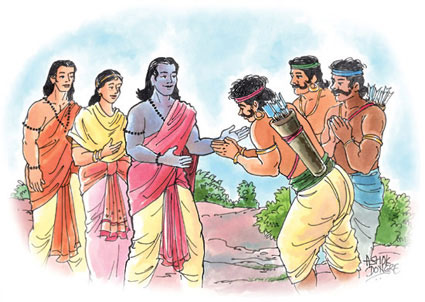Gautama Buddha delivered his first sermon in the language of Pali on the banks of the river Ganges at Varanasi. He spoke to a small audience of just five men who became his first followers as they saw that Buddha glowed with a brilliant inner radiance. Gradually, he drew larger and larger crowds and instructed them to spread his message far and wide. The core of his teaching consists of The Four Noble Truths, followed by The Eight-Fold Path. The Four Noble Truths are as follows: 1. The world is full of suffering and sorrow. 2. The cause of suffering is desire. 3. The renunciation of desires will lead to salvation from the world, and 4. The path to salvation can be achieved by following The Eight-Fold Path. The Eight Fold Path is as under: Right Knowledge means a basic and thorough understanding of the Four Noble Truths. Right Attitude means having an unselfish and mentally healthy attitude to life, free from hatred and covetousness. Right Speech means speaking words that are good and true. One should not lie or gossip. Right Action means always conducting oneself in a way that does not harm, hurt nor displease anyone. Adultery, cheating, stealing and murder are specifically denounced. Right Means of Livelihood means that one must always strive to earn ones livelihood by honest means. Right Effort means one should conscientiously strive to develop good tendencies and destroy negative inclinations. Right Awareness means we should introspect about our inclinations and not give in easily to temptation. Right Meditation means working towards training your mind towards intense concentration, which, in turn, will lead to salvation. Buddhism also advocated the doctrines of Karma and reincarnation. Buddha preached that the soul goes through many incarnations before it finally sheds all its Karma and is reunited to its pure state. He called this state Nirvana. This is a state where all the desires and cravings of the mind become extinct and a state of total, uninterrupted bliss is experienced. What is notable about Buddhism is the absence of a personal Creator or God in its tenets. While Buddha did not deny the existence of God, he preached that the universe is guided and governed by a Supreme Power that did not possess a name or form. Consequently, all rites and rituals became defunct.
Gautama Buddha delivered his first sermon in the language of Pali on the banks of the river Ganges at Varanasi. He spoke to a small audience of just five men who became his first followers as they saw that Buddha glowed with a brilliant inner radiance. Gradually, he drew larger and larger crowds and instructed them to spread his message far and wide.
The core of his teaching consists of The Four Noble Truths, followed by The Eight-Fold Path.
The Four Noble Truths are as follows:
1. The world is full of suffering and sorrow.
2. The cause of suffering is desire.
3. The renunciation of desires will lead to salvation from the world, and
4. The path to salvation can be achieved by following The Eight-Fold Path.
The Eight Fold Path is as under:
Right Knowledge means a basic and thorough understanding of the Four Noble Truths.
Right Attitude means having an unselfish and mentally healthy attitude to life, free from hatred and covetousness.
Right Speech means speaking words that are good and true. One should not lie or gossip.
Right Action means always conducting oneself in a way that does not harm, hurt nor displease anyone. Adultery, cheating, stealing and murder are specifically denounced.
Right Means of Livelihood means that one must always strive to earn one's livelihood by honest means.
Right Effort means one should conscientiously strive to develop good tendencies and destroy negative inclinations.
Right Awareness means we should introspect about our inclinations and not give in easily to temptation.
Right Meditation means working towards training your mind towards intense concentration, which, in turn, will lead to salvation.
Buddhism also advocated the doctrines of Karma and reincarnation. Buddha preached that the soul goes through many incarnations before it finally sheds all its Karma and is reunited to its pure state. He called this state Nirvana. This is a state where all the desires and cravings of the mind become extinct and a state of total, uninterrupted bliss is experienced.
What is notable about Buddhism is the absence of a personal Creator or God in its tenets. While Buddha did not deny the existence of God, he preached that the universe is guided and governed by a Supreme Power that did not possess a name or form. Consequently, all rites and rituals became defunct.































